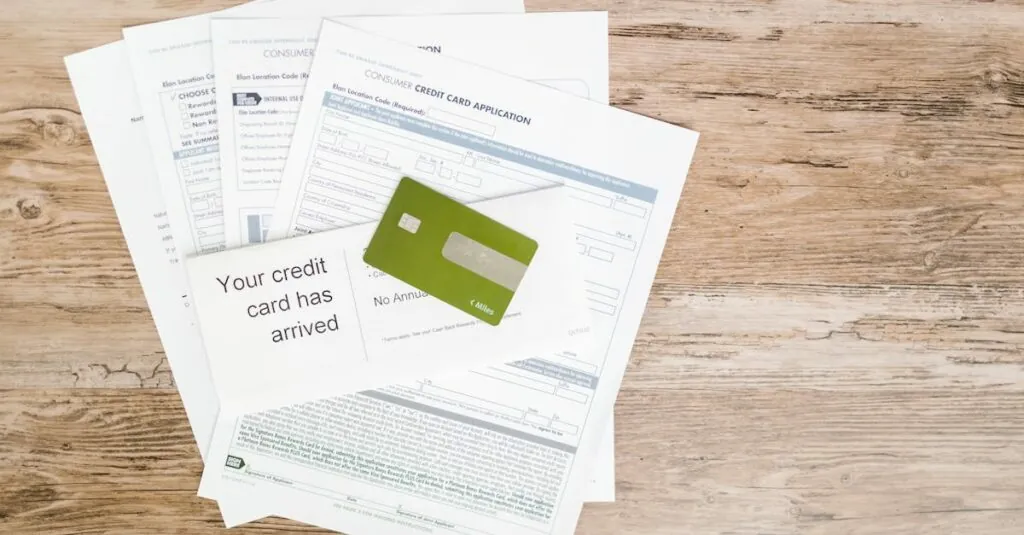Table of Contents
ToggleIn the world of credit cards, the Discover card often shines like a beacon of rewards and cash back. But before diving into the sea of benefits, there’s one crucial question: what credit score do you need to snag this shiny piece of plastic? It’s like asking how many licks it takes to get to the center of a Tootsie Pop—everyone’s curious, but the answer can vary.
Understanding Credit Scores
Credit scores play a crucial role in determining eligibility for financial products like the Discover card. These scores reflect an individual’s creditworthiness based on their credit history.
What is a Credit Score?
A credit score quantifies an individual’s credit risk. Typically, scores range from 300 to 850, with higher numbers indicating better credit quality. Credit scoring models, such as FICO and VantageScore, commonly assess factors like payment history and outstanding debt. A credit score directly influences loan interest rates, credit card terms, and approval chances. Lenders use these scores to evaluate a borrower’s risk level.
How Credit Scores are Calculated
Credit scores arise from several key factors. Payment history ranks as the most critical aspect, accounting for about 35% of the score. The amount owed contributes around 30%, while lengths of credit history, types of credit, and recent credit inquiries complete the scoring process. Understanding these components helps individuals manage their credit effectively. By maintaining timely payments and managing debt levels, individuals can improve their credit scores over time.
Discover Card Overview
Discover offers a range of credit card options designed to fit diverse financial needs. Each card provides unique features catering to various consumer preferences.
Types of Discover Cards
Discover provides several card types including the Discover it Cash Back, Discover it Miles, and Discover it Student cards. The Cash Back card allows users to earn 5% cash back on rotating categories each quarter, while the Miles card focuses on travel rewards with 1.5 miles for every dollar spent. For students, the Student card offers a straightforward entry into credit with rewards and no annual fee. Each card type serves a specific goal, making it easier for cardholders to choose according to their spending habits.
Benefits of Discover Cards
Benefits of Discover cards include cash back rewards, no annual fees, and a 0% introductory APR on purchases for the first year. Cash back earned can be redeemed as statement credits, gift cards, or direct deposits. Additional features often include purchase protection, fraud monitoring, and access to free credit scores. Cardholders gain a user-friendly experience through the Discover mobile app, which provides insights on spending and rewards tracking.
Credit Score Requirements for Discover Cards
Discover cards attract attention due to their appealing rewards. Understanding the credit score requirements can help potential applicants prepare for approval.
Minimum Credit Score Needed
Most Discover cards favor applicants with a credit score of 670 or higher. Individuals with scores in this range generally display good creditworthiness. Yet, some entry-level options exist, allowing applicants with lower scores to apply. Discover often considers other factors beyond just the score. Those with limited credit history might still qualify based on responsible financial behavior.
Factors That Affect Approval
Approval depends on multiple factors beyond the credit score. Payment history represents the most significant aspect influencing decisions. High credit utilization can negatively impact approval chances. Length of credit history also plays a substantial role; established credit profiles usually fare better. Additionally, the types of credit held may influence outcomes, as a mix can demonstrate reliability. Recent inquiries into credit can raise concerns regarding financial stability, affecting applications. Overall, many aspects contribute to the approval process for Discover cards.
Tips for Improving Your Credit Score
Improving a credit score requires strategic actions and consistent effort. Understanding key strategies enhances the chances of qualifying for financial products like the Discover card.
Managing Debt Responsibly
Managing debt plays a crucial role in boosting credit scores. High credit utilization negatively impacts scores, so aiming to keep it below 30% of available credit helps. Regularly reviewing account balances allows individuals to track their usage closely. Paying down existing debts reduces overall credit utilization. Considering debt consolidation may simplify payments and improve credit health. Keeping old accounts open positively affects the length of credit history, thus benefiting the score.
Paying Bills on Time
Paying bills on time significantly influences credit scores. Late payments can cause scores to drop dramatically, so setting reminders ensures timely payment. Automating bill payments eliminates the risk of missing due dates. It’s essential to prioritize high-interest bills to minimize overall finance charges. Consistently paying all bills on time builds a positive payment history over time. Regularly checking credit reports for errors also helps maintain accuracy, contributing further to an improved score.
Understanding the credit score needed for a Discover card is essential for potential applicants. While a score of 670 or higher generally indicates good creditworthiness, Discover also considers various factors in its approval process. This flexibility allows individuals with lower scores to access certain cards, especially entry-level options.
By managing credit responsibly and focusing on key areas like payment history and credit utilization, applicants can improve their chances of qualifying. With a range of Discover cards available, there’s likely an option that fits diverse financial needs. Taking proactive steps toward enhancing credit health can pave the way for not only obtaining a Discover card but also enjoying its valuable rewards and benefits.







